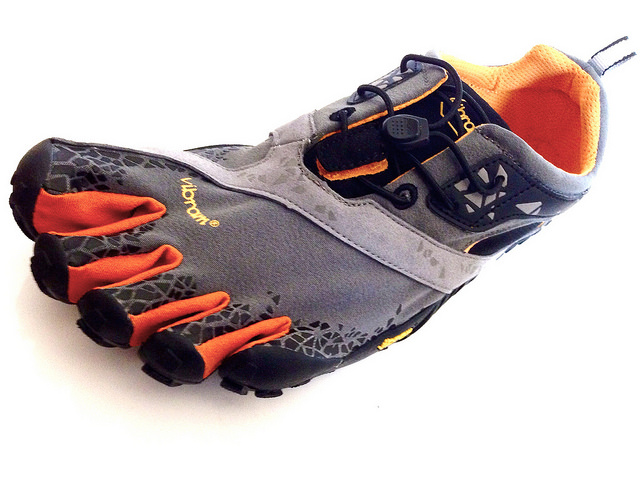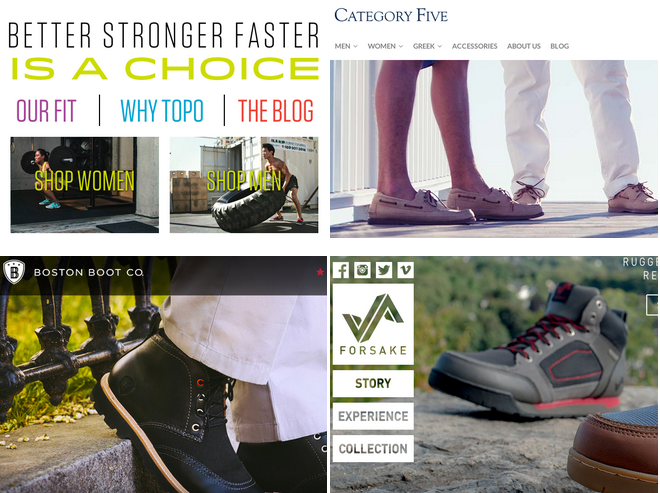(Clockwise, from top left: ToPo Athletic, Category Five, Forsake, Boston Boot Co.)
Boston is the shoe capital of the East Coast – in case you weren’t aware, here’s a quick run down on just one call-sheet of who’s got their headquarters in or around the Hub. Since Boston is also home to a bustling Innovation District, and to smart entrepreneurs and their startup endeavors, it’s only natural the two collide.
So what’s it like forging your own footwear brand in a city that’s already home to well-established companies, such as New Balance, Converse, Puma and Reebok? We spoke to six entrepreneurs to find out. Whether they’re looking to launch the next great running shoe, a line of boots that are both high-quality and comfortable or a new boat shoe to rival the also local Sperry Top-Sider, these guys are no stranger to thick competition, as well as friendly camaraderie in the local shoe sector.
In Boston, we found that these footwear startups have all dealt with three key factors as they’ve built their brands. Here’s what the city’s new shoe companies have in common.
A Sense of Camaraderie
The founders of Forsake, Category Five, Boston Boot Co. and ToPo Athletic each mentioned having close relationships with one another as footwear founders in Boston.

Tony Post, founder of athletic footwear brand ToPo, wrapped up the common sentiment: “We all commiserate on the challenges, the difficulties of starting a business, and then share in the success.” Post isn’t unfamiliar to success, either: In 2005, he spearheaded the launch of Vibram FiveFingers, one of the most innovative athletic-wear brands in past decades.
All of the startups are aiming to build shoe brands that are different enough in nature that they’re comfortable talking over what’s worked, what hasn’t and what to do next.
Sam Barstow, founder of outdoor footwear company Forsake, spoke to their sense of community.
“To meet up with a community of people who we have a lot in common with, it’s been really cool,” he said. “We’re different enough that we don’t have to worry about competing with each other – we can just help each other out, because we all know how hard it is.”
Boston’s Footwear Industry as a Resource
Another asset that Boston boasts for everyone in the footwear industry? Its wealth of wise resources – as in, the veterans currently working at Boston’s big brands.
“[There are] people who are always willing to give their two cents and their insight, and there’s a sense of excitement and energy that they love,” said Jason Shuman, founder of Category 5. “I think that they understand that it’s a difficult industry to be in.”
And they’re doing more than just getting insight from these experts. Barstow said he saw Boston as a talent pool waiting to be tapped.
We’re different enough that we don’t have to worry about competing with each other – we can just help each other out, because we all know how hard it is.
“While we were looking for designers, or people with experience in working on footwear, the talent pool is here. So that was a big hook for it; we could meet with them in person,” said Barstow. Currently, one of Forsake’s designers used to be full-time at New Balance.
For Boston Boot Co. and ToPo, its founders had 30 years of experience in the footwear industry already under their belts when they set out to launch new brands. While Post understands how competitive the footwear industry is, he found a community in Boston willing to help.
“It’s a very competitive industry already, so the nice thing about being in Boston is being with people with a lot of footwear experience and marketing, brands and consumer products experience,” said Post. “All those things are helpful, and there’s a good network of people you can talk to, a good number of people who understand the business.”
Similarly, Joe Lyons, co-founder of Boston Boot Co., alongside his partner Joe Prew (who’s been in the footwear industry for 32 years), sees Boston’s busy industry, and competition, as a positive resource.
“There’s a great infrastructure and platform here for somebody like us,” Lyons said. “There’s a lot of competitive business, and a lot of companies, like the ones Joe [Prew] has worked for, are big companies. But it helps that there are people to reach out to if you need a certain area of expertise.”
Consumer Products a Hard Sell for Venture Capital
Regardless of Boston’s resources, these startups aren’t necessarily cashing in. Another unifying factor for Boston’s footwear founders? It’s hard to raise funding when you’re a consumer product.
“It’s a harder sell, but that’s not because of Boston. That’s because the tech business is a much more attractive business for venture capital and investors — it’s highly leverage-able,” said Prew. “In the fashion industry or in footwear, you’re not coming up with a new app or a cure for cancer that you can roll out to the world for the first time. It’s shoes.”

